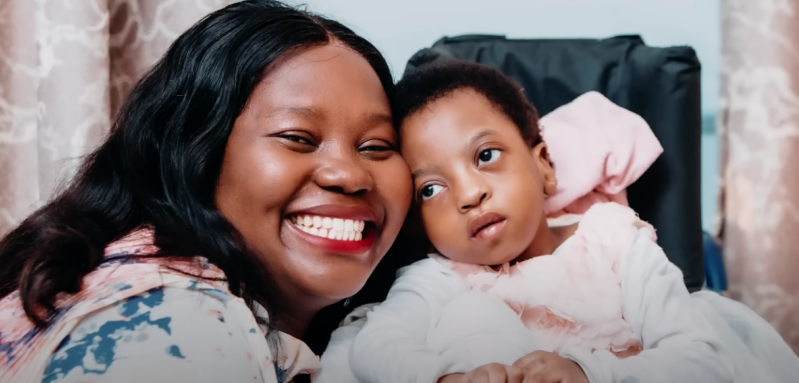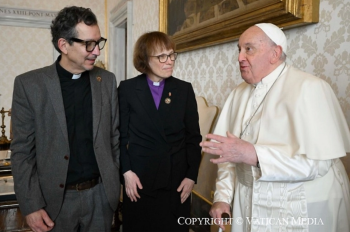
Titled ‘Open letter to my daughter, Dorcas’, Simfukwe narrated how the pain and anguish of finding out the condition of her daughter birthed her hit song ‘Chanzo’, a breakout gospel hit in East Africa that was released four years ago and has 14 million views on YouTube.
“I know your journey has not been easy, my daughter. The challenge you have faced is for the glory of our God. Your father and I have been waiting for this day to tell the whole world about your story,” said Simfukwe, who shared the video diary on Dorcas’ 6th birthday.
Simfukwe said Dorcas was in and out of hospital for various illnesses and unending flus in her earlier years. After some more medical tests, Dorcas was diagnosed with cerebral palsy, a disorder that affects a person’s movement, balance and posture caused by abnormal brain development before, during or after birth.
“We were devastated when the doctor told us the condition of our daughter has no cure and that she would need to be assisted throughout her life. We knew that our lives would not be the same, that we would miss the growing milestones of Dorcas, which is what all parents look forward to,” narrated Simfukwe.
The support of her loving husband and family reassured her that she was not going to carry Dorcas’ burden alone and indeed the love and encouragement turned out to be a unifying and bonding opportunity for the family.
It is also during this period that she penned her hit song ‘Chanzo’ which means ‘beginning’ in Swahili, her affirmation that God is her source and the reason for her existence. The hit song propelled her music ministry to new heights, winning her awards and opening new ministry opportunities.
“I chose to trust God and believe that His plans for my life are still on track despite the condition of our daughter. I realised that pursuing my dreams, despite the challenges I was facing, would be one way to show love to Dorcas,” said Simfukwe.
A crucial turning point for the family came when they agreed that they would fully embrace and celebrate Dorcas’ condition as well as fully live their lives without the sadness and sorrow that had surrounded them since the diagnosis.
Simfukwe had battled her own thoughts and fears about going public with Dorcas’ story. “Would people accuse me of being a bad mother? Would they say the condition was caused by my negligence? That I didn’t eat well during pregnancy?” she wondered.
But through the encouragement of her family, Simfukwe decided to tell the world about her journey dealing and taking care of a child with a neurodevelopmental condition. “The world needs to know about children that need special assistance due to their condition, and respond with love, understanding and support for families taking care of these children,” said Simfukwe.
It is through this experience that Simfukwe and her husband started Dorcas Homecare Initiative, which runs a facility that offers support for children with neurological conditions and their families. Launched on Jan. 13, 2025, the facility offers physiotherapy equipment and sessions, wheel chairs, diapers, special beds, a playground and other essential services and facilities for children with cerebral palsy.
Having such a facility will meet some of the critical needs that parents of children with cerebral palsy struggle with such as the cost of therapy, medical care and special education. Dr Rev Phidel Baraza, the founder and CEO of Beauty Out of Mire Trust (BOOM), told Christian Daily International that parents raising children with disabilities grapple with emotional and mental strain.
“The journey is overwhelming, filled with moments of grief, uncertainty, and burnout due to the demands of caregiving. Many schools lack trained teachers, adaptive learning materials, and accessible infrastructure, forcing parents to either homeschool or seek expensive specialized schools,” explained Rev. Baraza.
BOOM Trust was also founded from her experience raising her 14-year-old daughter, Raziela Miracle, who was born with multiple neurological disorders, including autism, cerebral palsy, delayed developmental milestones and sensory processing disorder.
Rev. Baraza, through the Trust, is committed to educating family members on how to offer emotional and practical help to parents of children with disability and to “normalize and create an inclusive home environment.”
She also advocates for inclusive government policies to support special education and create accessible physical environments such as ramps, sensory-friendly spaces and disability-friendly restrooms.
“The Church can do more to provide care and counseling for parents who need spiritual and emotional support. It can also establish inclusive ministries and train leaders and congregants to understand and accommodate disabilities in both physical spaces and programs,” said Rev. Baraza.





